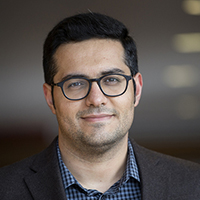Control Seminar
Eco-Mobility: Leveraging Connected and Automated Driving Technologies to Improve Energy Efficiency of the Vehicular and Transportation Systems
This event is free and open to the publicAdd to Google Calendar

Abstract
With the emergence of connected and automated vehicles (CAVs) equipped with advanced sensors for perception and localization, communications and feedback have become more integrated and ubiquitous, leading to tangible benefits with enhanced safety and improved energy efficiency, i.e., eco-mobility. While abundant evidence has been accumulated showing substantial energy-saving potential of the CAVs by up to 20%, uncertainties associated with real-world vehicle speed forecasts are remained to be the main challenge in harvesting energy from connectivity data. Additionally, the implications of the CAVs operation on the vehicular thermal system, with a slower time-scale as compared to power systems, have not been fully understood. This talk presents our efforts to address these challenges by developing an integrated power and thermal management (iPTM) strategy for CAVs (iPTM-CAVs). The iPTM-CAVs is based on hierarchical optimization, which allows for exploiting the connectivity data and traffic prediction models over different horizons with different accuracies. We will show how to leverage the hierarchy structure to enhance the robustness against the uncertainties using a new intelligent constraint handling mechanism. Next, the talk will touch upon our recent work on multi-range vehicle speed prediction using big data analytics tools, and incorporating this prediction into the hierarchical optimization framework for improved efficiency and robustness. The experimental and simulation results of applying the iPTM-CAVs will be presented for different applications, including power and thermal management of battery, cabin, engine, and exhaust aftertreatment systems of electrified vehicles.
Biography
Mohammad Reza Amini is currently an Assistant Research Scientist at the Naval Architecture and Marine Engineering department of the University of Michigan (UM). He was a Postdoctoral Research Fellow at the Real-Time Adaptive Control Engineering (RACE) Lab at the UM from June 2017 to January 2019. He received his Ph.D. in Mechanical Engineering from Michigan Technological University, Houghton, in 2017. He is the author of over 30 peer-reviewed journal and conference papers in the broader area of control, optimization, automotive, energy, and intelligent transportation systems. He is an associate editor for the IEEE Conference on Control Technology and Applications (CCTA), and has served as co-organizer/co-chair of several invited technical sessions at the American Control Conference (ACC), IEEE Conference on Decision and Control (CDC), and ASME Dynamic Systems and Control Conference (DSCC) since 2016. He is a member of IEEE, ASME, and SAE.
 MENU
MENU 
